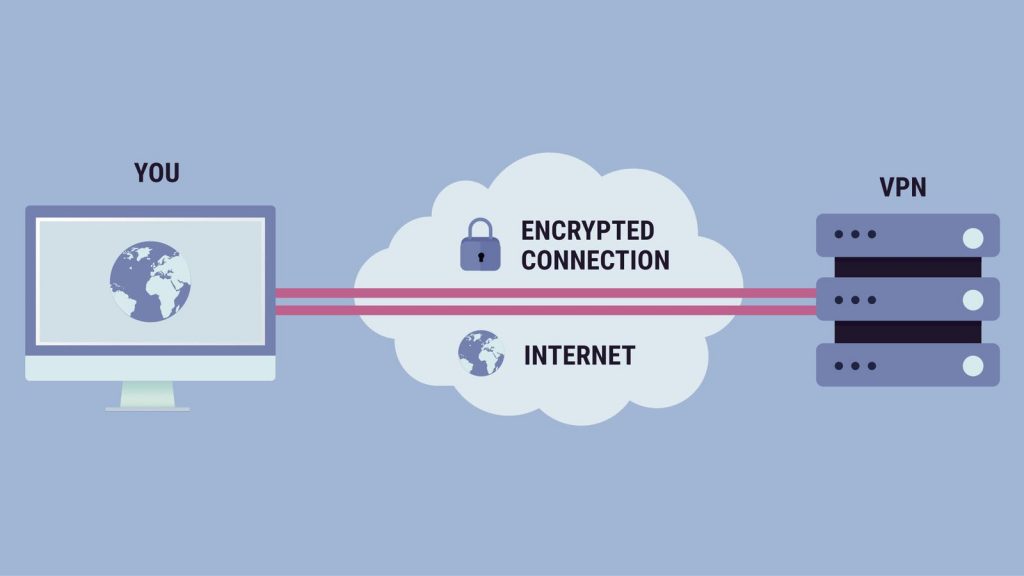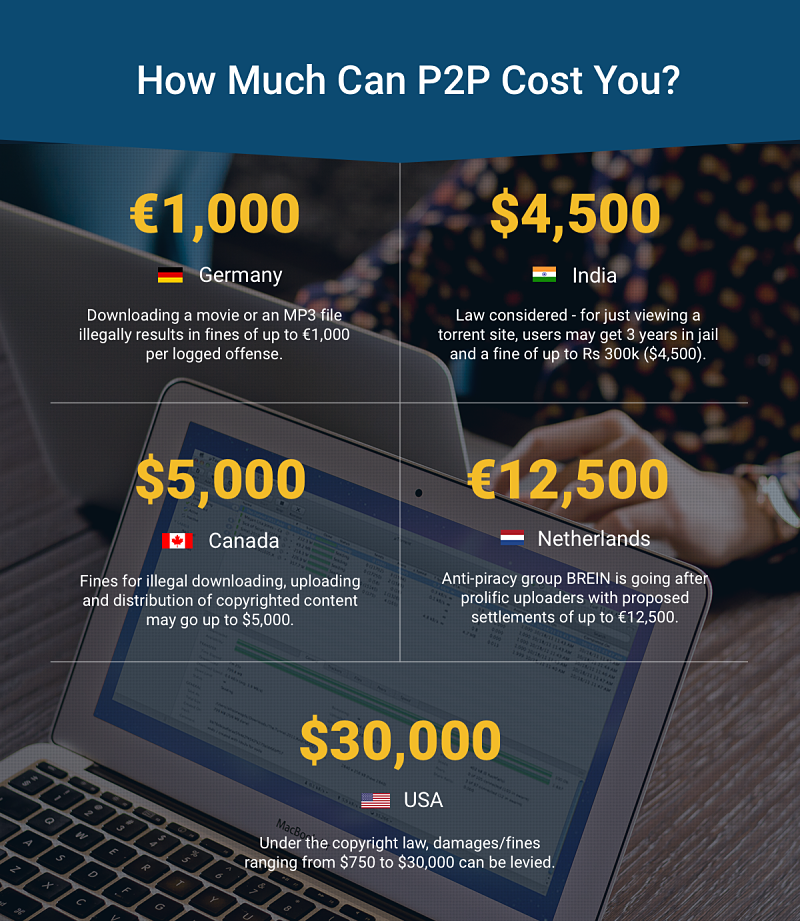Using a VPN will hide and secure everything you do on the internet. Your ISP and authorities will not be able to identify or track you while using a VPN.
In a nutshell
A VPN (Virtual Private Network) allows you to connect your device to a 3rd party network over the internet. Common VPN uses include:
- individuals using a VPN services to become anonymous and secure
- employees wanting to connect into their company network over the internet, without having to be on premises
We will use the scenario of a private individual looking to make their internet usage anonymous and secure throughout this website and assume availability of the most common features that good a VPN provider offers.
What does a VPN do?
A VPN sits between you and the internet, routing all of your activity through its servers. You’ll connect to your VPN service from your device (tablet, PC etc.) or router and access the internet from your chosen VPNs server, taking on its’ IP address rather than showing yours.
Your IP (Internet Protocol) address is provided to you by your ISP (Internet Service Provider). It is is what personally identifies you on the internet while browsing websites, emailing, streaming, downloading files, P2P (Peer to Peer) file sharing and so on. Your IP address can be used to identify you.
The VPN will encrypt your internet activity meaning neither malicious people, nor your ISP can snoop on what you’re doing.

Since you’re accessing the internet through the VPN’s servers you will take on the IP address of that server, hiding your own IP address. You will therefore appear to be accessing the internet from the VPN’s own server, from its location in the world.
Why use a VPN?
Streaming Copywrite material online without required subscriptions can land you in legal trouble. With your internet activity being monitored by governments, your ISP and even movie studios and publishers, using a VPN to protect you is vital. Here are how VPNs provide a great number of benefits to an internet user.
Annonimity
Using the internet can be particularly risky for political activists, journalists, and bloggers, who live/work in countries with authoritarian governments, with high levels of Internet surveillance and censorship. Even people doing research on sensitive topics and want to avoid unnecessary trails leading to investigation and backlash would feel at risk.
So whether you believe your internet activity could cause unnecessary risk to you or you just believe that privacy is a basic human right – you want to be as secure and anonymous as possible.
However, data is collected about you all the time when using the internet.
Search Engines
Search engines such as Google and Bing record the web searches you make and log them against your IP address. The various reasons include marketing and future searches, which will be shared across other devices using your internet connection. This information could also be provided to authorities such as police.
It’s important to note that browser features such as in private browsing will only stop things like cookies and browsing history being stored locally in your browser and will not hide your activity on the internet.
Your ISP
ISP’s have visibility of what you do on the internet, many compile logs which they can sell to marketing companies and thus be accessed by external organisations. If approached with a subpoena by police, they will be legally obliged to provide whatever information they have on you.
Since your activity through a VPN is encrypted, your ISP will not be able to snoop on your internet traffic, logging your activity and potentially throttle your speed based on what you’re doing.
Security
With more daily things being done online security is a huge concern and you need to ensure your online activity is as secure as possible, especially when doing the most sensitive things such as online banking.
Video Calls
VOIP (Voice-over-IP) calls through services such as Skype are fairly easy to eavesdrop on by a malicious internet user.
Public WiFi
Public WiFi is normally not encrypted and very easy for someone with the right software to intercept and see what you’re doing and capture your information. Signing into a VPN whilst on a public WiFi will encrypt your internet activity and make you more secure to these vulnerabilities.
Hackers
With your unencrypted activity being logged against your own personal IP address, it’s much easier for hackers or malicious users to identify you and compromise your security.
Using a VPN makes you anonymous since your access to the internet will be from the VPN’s own server IP address and not yours. Whats more, your activity through a VPN is encrypted, making it much harder for any hacker to perform malicious acts against you.
Downloading
Media associations are always hot on the tail of P2P file sharers when it comes to sharing movies, TV shows and music. When downloading a torrent, for example, you share parts of the file for others to download from you – publicizing your IP address for them to connect to. All an intereseted party has to do is pose as another sharer and they can access your IP address and request further identifying information and/or action from your ISP.

Bandwidth Throttling
ISPs can limit your connection speeds based on the type of internet traffic you’re generating. For example, your ISP may detect BitTorrent traffic or video streaming and decide to ‘throttle’ your connection, posing limitations. When connected through an encrypted VPN your ISP will not be able to tell the kind of traffic you are creating and therefore unable to apply throttling.
Geo-Locked Content
Streaming services such as Netflix can block content based on location, for example, a TV show available in the US may not be accessible in Europe. This is enforced by getting your location from your IP address. While using a VPN you can connect to a server in the relevant country in order to gain access this content.
Will a VPN slow my connection down?
It’s likely that while connected to a VPN your connection speed will be reduced. If you’re connected on 200mb fiber optic then don’t expect to reach these speeds on a standard VPN service.
This is mainly due to the extra work being carried out to encrypt everything you do and the traffic on your chosen server.
That being said, this shouldn’t have an impact since VPN speeds should happily cope with intended usages like downloading and streaming video. Moreover, when connecting multiple devices locally on the device through an app they will not be sharing one VPN connection. You should be able to state what kind of thing you’ll be doing and it’ll choose the best server with the lightest load for you.
you can always choose when to use your VPN, for example, if you really need that full 200mb bandwidth then you may choose not to connect through your VPN at that moment, with the knowledge not to do anything sensitive until you’re back on.
If connecting to a VPN provider via a router, you can leave your ISP provided routers’ WiFi on for direct internet access and choose to connect to your VPN enabled router for safe, secure and anonymous access.
What features do I need from my VPN?
Here’s a checklist of some of the features you’ll probably want, to get the best of your VPN service. Any VPNs recommended on Stream Guides will have these covered.
Encryption
Your VPN service should provide a good level of encryption, some boast military grade standards such as AES-256-CB and even double encryption.
No logging
A good VPN provider will have a no logging policy, further ensuring that your activity is anonymous and private.
Jurisdiction
The country your VPN provider is based in has an impact on the laws they must abide by and how anonymous they can make you. For example, NordVPN is based in Panama which has no data retention laws.
Simultaneous VPN connections
If you have a typical household with numerous devices connected to the internet, you’ll want to make sure you can connect more than one device at a time to your VPN service.
Kill switch
Some VPN providers offer a ‘kill switch’ that will immediately block internet traffic should your VPN connection drop, stopping your internet activity from unwittingly being exposed.
Ways to connect
Having multiple devices in your home like laptops, tablets, smart phones and so on, you’ll need your VPN provider to offer apps on platforms such as
android, Windows, iOS etc.
Support
You may have questions when configuring and making good use of your VPN service so its important to know you can get support you need quickly. A lot of VPN providers offer a web chat feature from their website as well as normal email support, which can be a great tool to sort any issues you have quickly to get you up and running
How do I use a VPN?
Check out our guide on how to use a VPN.
VPN providers will supply you with the tools you need to connect up and use their service.
Connect to a VPN through an App
You’ll have access to apps for your devices to sign into your VPN connection when you need to. These can normally be set to always keep the VPN connection on or only when you choose connect.
You’ll need to download their app, login and hit a button to connect. Most apps will show a symbol in a notification area on your device to show you’re good to go, and also provide a link to visit that will confirm to you that you’re protected behind your VPN.
Connect to a VPN through your router
You can setup your VPN connection directly through your router so that any devices connecting to the internet via this router will use the VPN service.
Lookout for specific guides on http://streamguides.co.uk on how to hook up your VPN connection through a router.
Recommendations
Check out our VPN recommendations page.
We can recommend some tried and tested VPN services which nicely cover the features discussed, at a decent price point.
NordVPN

Private Internet Access
ExpressVPN

StrongVPN

